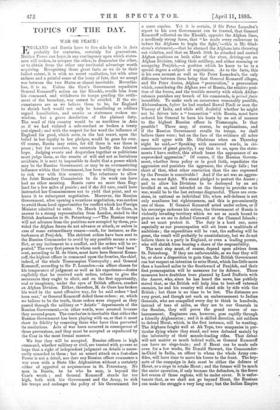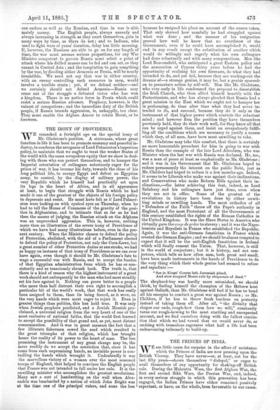TOPICS OF THE DAY.
WAR OR PEACE ? ENGLAND and Russia have to live side by side in Asia probably for centuries, certainly for generations. Neither Power can hope, in any contingency upon which statesmen will reckon, to conquer the other, to dismember the other, or to obtain from the other any territorial advantage worth acquiring. Recognising those great facts as we do to their fullest extent, it is with no secret exultation, but with utter sadness and a painful sense of the irony of fate, that we accept war between the two States as almost inevitable. Nevertheless, it is so. Unless the Can's Government repudiates General Komaroff's action on the Khuskh, recalls him from his command, and withdraws its troops pending the settlement of the boundary, war cannot be avoided. If the circumstances are as we believe them to be, for England to shrink back would not only be humiliating as soldiers regard humiliation, and unwise as statesmen reckon unwisdom, but it grave dereliction of the plainest duty. The word of this country would be as worthless in Asia as if we had violated a safe-conduct or broken a treaty just signed ; and with the respect for her word the influence of England for good, which rests, in the last resort, upon the belief in her loyalty to her pledges, would be gone for ever. Of course, Russia may retire, for till there is war there is peace ; but for ourselves, we entertain hardly the faintest hope. Judging events and despatches together as politicians must judge them, as the results of will and not as fortuitous accidents, it is next to impossible to doubt that a power which may be the Russian Government, or may be an overmastering influence within that Government, has been willing or desirous to risk war with this country. The reluctance to allow the Joint Boundary Commission to do its work can have had no other meaning. Russia cares no more than England for a few miles of prairie ; and if she did care, could have instructed her Commissioners not to yield that point, and so leave it to subsequent negotiation. Moreover, the Russian Government, after opening a vexatious negotiation, was careless to avoid those local opportunities for conflict which her Foreign Minister admitted to exist. On March 17th M. de Giers, in answer to a strong representation from London, stated to the British Ambassador in St. Petersburg :—" The Russian troops will not advance from the positions now occupied by them, provided the Afghan forces-do not advance or attack, or unless in case of some extraordinary reason—such, for instance, as disturbances at Penj-deh. The strictest orders have been sent to the Russian Commander to avoid by any possible means a conflict, or any incitement to a conflict, and the orders will be repeated." The very first person to whom such orders" had been" sent, according to M. de Giers, must have been General Komaroff, the highest officer in command upon the frontier, the chief, indeed, of the whole Transcaspian Viceroyalty ; and General Komaroff, according to Sir P. Lumsden—an officer chosen for his temperance of judgment as well as his experience—denies explicitly that he received such orders, refuses to give the assurances they ought to elicit, and on the first opportunity, real or imaginary, under .the eyes of British officers, crushes an Afghan Division. Either, therefore, M. de Giers has broken his word in the most offensive way, for he said orders " had been sent," or General Komaroff defied those orders; or, which we believe to be the truth, those orders were stopped a§ they passed through the military or " Asiatic " departments of the Russian Government,—in other words, were arrested because they secured peace. The conclusion is inevitable that either the Russian Government has been playing with us, or that it must show its fidelity by removing those who have thus perverted its resolutions. Acts of war have occurred in consequence of those perversions, and they must be accepted or repudiated by the Czar in the most formal manner.
We fear they will be accepted. Russian officers in high command, whether military or civil, are trusted with powers so large that a right of independent judgment on details is necessarily conceded to them ; but an armed attack on a first-class Power is not a detail, nor dare any Russian officer commence a war even with a State like Afghanistan without a certainty either of appro'val or acquiescence in St. Petersburg. No man in Russia, be he who he may, is beyond the Czar's wrath ; and General Komaroff stands far too high, both with his Government and the Army, to risk his troops and endanger the policy of his Government for a mere caprice. Yet it is certain, if Sir Peter Lumsden'a report to his own Government can be trusted, that General Komaroff collected on the Khuskh, opposite the Afghan lines, a needlessly strong force, that " he made every endeavour to induce the Afghans to begin the fight,"—this is Mr. Gladstone's statement,—that he alarmed the Afghans into throwing out videttes, and that on March 30th he attacked and carried Afghan positions on both sides of the river, driving-out an Afghan Division, taking their artillery, and either storming or occupying Penjdeh,—a position which he knew to be in a special degree a subject of negotiation. As to the facts, this is his own account as well as Sir Peter Lumsden's, the only difference between them being that General Komaroff alleges, and Sir Peter denies, Afghan " provocation," a provocation which, considering the Afghan awe of Russia, the relative position of the forces, and the terrible severity with which Abdurrahman punishes any breach of his commands, is prinui facie incredible. To make such an occurrence reasonably possible, Abdurrahman, before he had reached Rawul Pindi or seen the Viceroy of India, and while still doubtful whether he might not be driven into a " transaction " with Russia, must have ordered his General to burn his boats by an act of menace to the highest Russian officer in Transcaspia. Is that possible ? There may, of course, be explanations, and if the Russian Government recalls its troops, we shall believe there were ; but on the face of the evidence all sober men will agree with Mr. Gladstone when on Thursday night he said,—" Speaking with measured words, in circumstances of great gravity, I say that to us, upon the statements I have.recited, this attack bears the appearance of an. unprovoked aggression." Of course, if the Russian Government, whether from policy or in good faith, repudiates the aggression and punishes the aggressor, the charge falls ; but short of that, what other conviction than the one expressed by the Premier is conceivable ? And if the act was an aggression, we must fight. We stand pledged to protect the Ameer ; and to allow his Divisions to be destroyed by an act levelled at us, and intended on the theory to provoke us to war, would be to the last extreme disgraceful. There are occasions, in national as individual life, when self-defence is not only manliness but righteousness, and this is pre-eminently one of them. If General Komaroff acted under orders, or if his sovereign endorses his action, the Government of Russia is violently invading territory which we are as much bound to. protect as we are to defend Cornwall or the Channel Islands ; and we must protect it. The duty is a hard one, more especially as our preoccupation will set loose a multitude of ambitions ; the expenditure will be vast, the suffering will be great, the result will probably be unsatisfactory, but we do not believe there is a party in England, or even a leading person, who will shrink from bearing a share of the responsibility.
The next step must, of course, depend upon advices from St. Petersburg. If they are unfavourable, as we fear they will be, or show a disposition to gain time, the British Government can but suspect an intention to seize Herat, which lies little more than a hundred miles to the Southward of Penjdeh, and their first preoccupation will be measures for its defence. Those measures have doubtless been planned by Lord Dufferin with the Ameer, who, since he has heard the news, has publicly stated that, as the British will help .him to beat-off external enemies, he and his country will stand side by side with the British ; but there is no time to be lost. The distances are very great, and though not such an embarrassment to Indian Generals, who are compelled every day to think in hundreds, instead of tens of miles, as they are to our Generals in the Soudan, they will prove the grand source of embarrassment. Engineers can, however, pass rapidly through a friendly Afghanistan ; and it is skilled direction, not soldiers to defend Herat, which, in the first instance, will be wanting. The Afghans fought well at Ak Tepe, two companies in particular dying where they stood, and were defeated mainly by the inferiority of their muzzle-loading rifles. That defeat will not matter so much behind walls, as General Komaroff can have no siege-train ; and if Herat can be made safe even for a few weeks, Sir Donald Stewart, the Commanderin-Chief in India, an officer in whom the whole Army confides, will have time to move his forces to the front. The keynote of the campaign in Asia must be either the defence of Herat, or a siege to retake Herat ; and the former will be much the easier operation, if only because the defenders, in the fierce hot season of those regions, will be under cover.It is unfortunate that, as we shall not go beyond Herat, the Russians can make the struggle a very long one; but the Indian Empire can endure as well as the Russian, and time in war is ultimately money. The English people, always unready and always increasing in strength as they exert themselves, gain in many ways by time, as Slays do not ; and to Indians, who used to fight wars of years' duration, delay has little meaning. If, however, the Russians are able to go on for any length of time, the war must assume serious proportions, for any War Minister competent to govern Russia must select a point of attack where his drilled masses can be fed and can act, as they cannot in Central Asia ; and the temptation to gain somgthing by the war, by flooding either Armenia or Persia, will be nearly irresistible. We need not say that war in either country, with an enemy controlling such resources in men, would involve a terrible strain ; yet, if we defend neither—and we certainly should not defend Armenia—Russia may come out of the struggle a defeated victor who has won a kingdom. There is no native force in Persia which could resist a serious Russian advance. Prophecy, however, is the vainest of occupations; and the immediate duty of the British people, if Russia intends aggression, is, unhappily, too clear. They must enable the Afghan Ameer to retain Herat, or be forsworn.



































 Previous page
Previous page